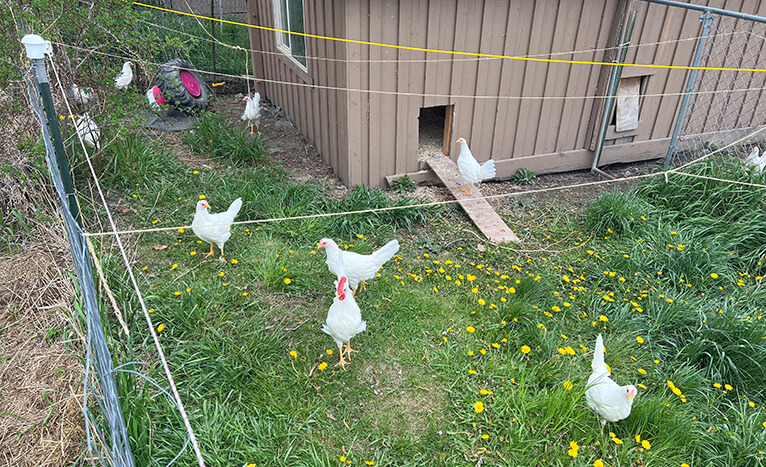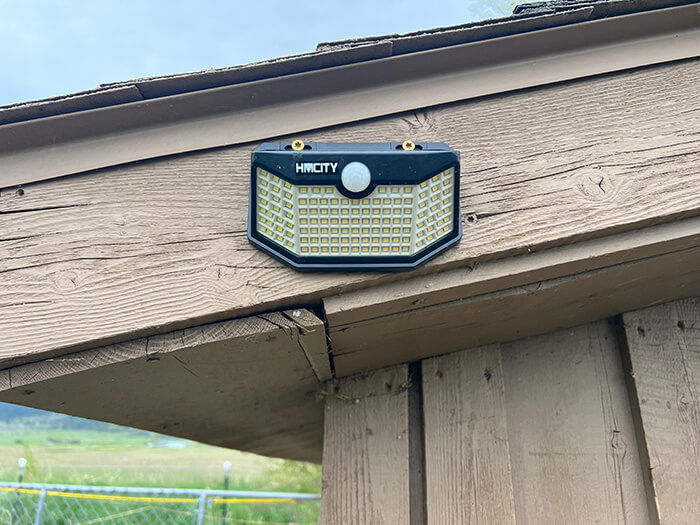So you just got some chickens and are wondering how to keep them safe from predators—I was in your shoes a few months ago! I had bought my 10 little leghorns and had to formulate a plan for them FAST! The road has been pretty smooth (aside from a brief coop fire—no one was hurt.)
I live in an area with a plethora of eagles and hawks. These huge birds are constantly making their rounds in the sky around my property and two hawks even sleep in the tree above the chicken coop—yikes. Foxes run amuck out here and have been creeping closer to the property now that I have chickens and they have been developing their voices (my rooster is beginning to cock-a-doodle-doo.) Snakes slither through the thick grass, and I know they would love one of my little chickies as a quick treat, but that is the LAST thing I want!
I wanted my chickens to be able to free roam around their enclosed chicken run, so I created a safe area for them. So far, so good. No predator attacks and I can go about my day without fear brooding in my mind about potential dangers lurking about.
How do I keep my chickens safe from predators?
First, evaluate what kind of predators you have in your area. My area may be different than yours. Eagles and hawks are my biggest concern, so I needed to address that as soon as possible before I let the chickens outside to roam. Before I even let them out of the coop, I installed these solar motion-detector lights above the entrances to the coop. I would suggest installing these lights around your coop because if a predator moves close to the coop at night, the sudden light flickering on could startle them and cause them to dart away.
Birds of prey like eagles, hawks, owls, and falcons are one of the most common chicken predators. They scope out your chickens from above and swoop in for the kill—don’t let this happen!
How do I protect my chickens from birds of prey?
If you don’t have an covered chicken run, then you will definitely want to invest in some string or twine to interlace over the top of your chicken run. Birds of prey don’t like to land in areas where they don’t have a clean escape route. The closer they dive to a crisscrossed area, they will won’t be able to map a clear escape, instead they will fly off. Simply go back and forth above the chicken run with your string or twine to keep the area above your chickens a safe place from birds of prey.
Another way to protect your chickens is to plant foliage around the run. I’ve noticed when a shadow flies overhead of my chickens, they stiffen up and dart for cover under various bushes (even though I have the top of their run covered in twine, but they don’t know that.) Chickens are aware of their predators and will seek safety, so plant them some safety! Bushes, trees, and other plants can provide this safety to them.
How do I protect my chicks from foxes and coyotes?
Both of these predators are sneaky and can find their way into the chicken run or coop through various means. Foxes can slip through small openings while coyotes can jump over six feet tall fences. Secure your chicken run and coop to the best of your ability! Make sure your chicken coop entrances are secure at night so these predators can’t sneak into the coop. Once they’re in, it is BAD NEWS. You can line the top of your fencing with electric fencing to deter these predators. Consistently check around your coop to make sure no openings have formed that you aren’t aware of.
The noises your chickens make will attract predators, especially if you have a rooster. Roosters are loud and predators can hear them from a way off, and they hear these noises as an invitation.
Other predators include: skunks, raccoons, weasels, bears, mountain lions, bobcats, wild dogs, and possums. Depending on your area, you may be dealing with a variety of predators from this list.
How do I prevent predators from getting in the coop?
Secure the area, know the predators in your area, and prepare accordingly. If you can, provide tall fencing that will make it difficult to climb over for any predator and put a line of electric fencing at the top. The previous owners of my property had a line of electric fencing. Unfortunately, it’s fallen into disrepair like many things around here, so I have to get that back into full swing. If you have predators that dig, then dig your fencing six inches to a foot into the ground, so digging into the area is not easy.
Besides installing motion detection lights, you can also install a baby monitor or game camera in the coop so you can check on your flock during the night. Cameras can sense for movement and alert you. Along with light, noise can keep predators at bay, so you can have a battery radio that plays outside the coop at night.
Keep an eye on your flock when they are outside. Definitely take your chickens in at night because nighttime will be the time that most predators will be operating. Have an automatic door or a good locking system for the door or doors that open into your coop. You don’t want a doors that are easy to open.
Having a rooster be a part of the flock as its ups and downs. Roosters will claim the hens and fight to the death any predators that try to harm the flock. Unfortunately, the rooster may see you as a threat and try to attack you as well when you are around—they can be grouchy. Avoid grouchy roosters by handling them a lot when they are young.
Geese are another bird that you can add to the flock that will protect. This is another animal that you will have to deal and care for, but they are larger and can defend the chickens better than the chickens can! I will definitely be adding geese to my flock as it adds biodiversity and can decrease flock disease when you have different breeds of animals intermixing and grazing in the same area.
There are many ways that you can keep your flock safe. Start with knowing the predators in your area then prepare your coop and run accordingly!


